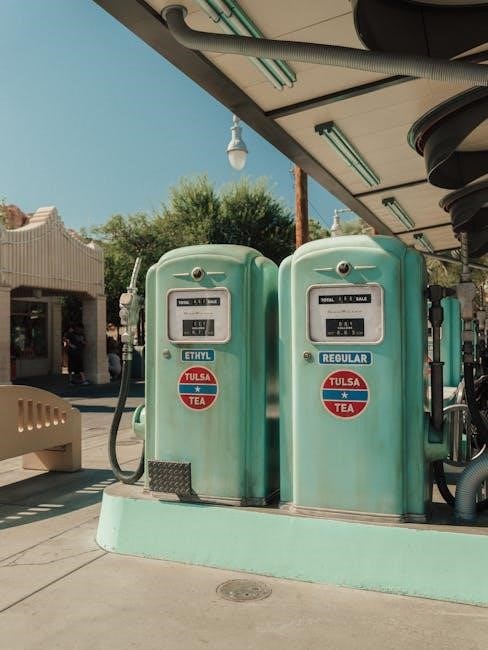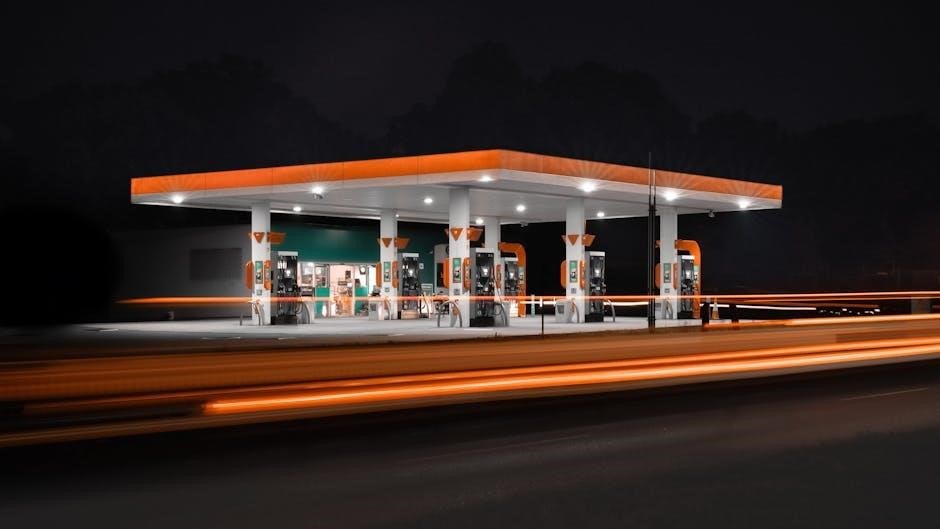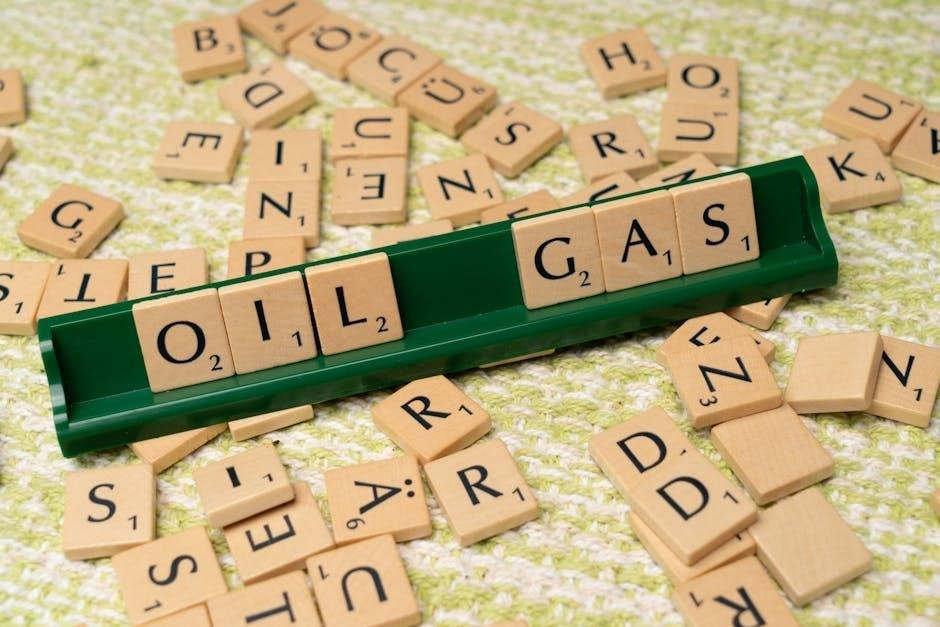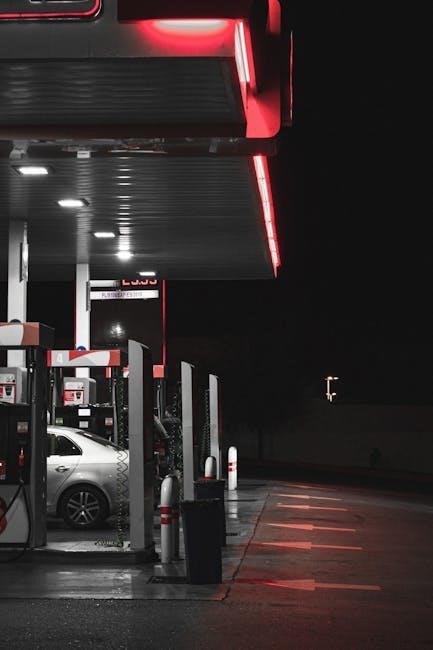The International Fuel Gas Code (IFGC) is a model code regulating fuel gas systems, ensuring safety and efficiency. Developed by the ICC, it provides design, installation, and safety standards for gas systems and appliances, widely adopted across jurisdictions to safeguard public health and safety.
Overview of the IFGC
The International Fuel Gas Code (IFGC) is a comprehensive model code that establishes minimum requirements for the design, installation, and safety of fuel gas systems and gas-fired appliances. It is developed by the International Code Council (ICC) to ensure public health, safety, and welfare. The IFGC covers various aspects, including piping, venting systems, combustion air provisions, and gaseous hydrogen systems. It is widely adopted by jurisdictions across the U.S. and Canada to standardize fuel gas practices. The code is regularly updated to incorporate new technologies and safety advancements, ensuring it remains relevant and effective in protecting communities.
Purpose and Scope
The International Fuel Gas Code (IFGC) aims to safeguard public health, safety, and welfare by providing regulations for fuel gas systems and appliances. Its scope includes design, installation, and maintenance standards for gas piping, venting systems, combustion air provisions, and gaseous hydrogen systems. The code ensures safe and efficient fuel gas use, protecting people and property from hazards. It applies to both residential and commercial systems, offering a framework for jurisdictions to adopt and enforce. The IFGC promotes consistency and innovation, allowing for new materials and methods while maintaining strict safety standards.

Key Features and Provisions of the IFGC
The IFGC establishes essential requirements for fuel gas systems, ensuring safe design, installation, and operation. It covers gas piping, venting, combustion air, and gaseous hydrogen systems, promoting public safety and efficiency.
Design and Installation Requirements
The IFGC outlines comprehensive design and installation standards for fuel gas systems, ensuring safety and efficiency. It regulates piping, appliances, venting systems, and combustion air provisions, addressing materials, sizing, and connections. Detailed requirements for gaseous hydrogen systems and motor vehicle fuel-dispensing stations are also included. The code emphasizes proper installation techniques to prevent hazards and ensure compliance with performance-based standards. These provisions aim to safeguard public health and safety while allowing flexibility for innovative designs and materials. Adherence to these requirements is critical for maintaining reliable and secure fuel gas systems.
Safety Measures for Fuel Gas Systems
The IFGC emphasizes robust safety measures to prevent hazards in fuel gas systems. It mandates gas leak detection systems, emergency shutoff valves, and proper venting to ensure safe operation. The code requires regular inspections and certifications to maintain system integrity. Safety standards also address combustion air provisions and explosion prevention, ensuring compliance with performance-based criteria. These measures minimize risks associated with fuel gas systems, protecting occupants and property. The code’s safety protocols are continuously updated to reflect advancements in technology and address emerging risks, ensuring a high level of protection for communities.
Regulations for Gas-Fired Appliances
The IFGC outlines strict regulations for gas-fired appliances to ensure safe and efficient operation; It covers design, installation, and venting requirements, as well as performance standards for appliances. The code mandates proper sizing of venting systems and combustion air provisions to prevent hazards like carbon monoxide buildup. Additionally, it requires regular inspections and certifications to ensure compliance. These regulations apply to various types of gas-fired equipment, including boilers, water heaters, and furnaces. By enforcing these standards, the IFGC helps reduce risks associated with gas-fired appliances, promoting public safety and protecting property from potential hazards.

Adoption and Enforcement of the IFGC
The IFGC is adopted by jurisdictions and enforced by local authorities. They insert local details and enforce through inspections, penalties to ensure compliance and safety.

Process of Adoption by Jurisdictions
Jurisdictions adopt the IFGC by integrating it into local laws through ordinances. They insert specific local details, such as jurisdiction names, ensuring compliance with regional requirements. Governments enforce the code, with authorities like city councils approving its adoption. The process often involves public hearings and reviews to address local needs. Once adopted, the IFGC becomes legally binding, guiding fuel gas system installations and safety standards. This structured approach ensures uniformity while allowing adaptability to local conditions, promoting public safety and regulatory consistency across jurisdictions.
Role of Local Authorities in Enforcement
Local authorities play a crucial role in enforcing the IFGC, ensuring compliance with its safety standards. They conduct regular inspections of fuel gas systems and appliances to verify adherence to code requirements. Enforcement agencies issue permits and certifications, while addressing violations through penalties or corrective actions. Local jurisdictions may also adopt additional amendments to tailor the code to regional needs. By upholding the IFGC, these authorities protect public health and safety, maintaining community resilience and preventing hazards related to gas systems.

Accessing the International Fuel Gas Code
The International Fuel Gas Code (IFGC) is accessible via the ICC’s official website and other platforms. Free PDF versions are available for download, ensuring broad accessibility for professionals and jurisdictions.
Free PDF Download Options
Free PDF downloads of the IFGC are offered through reputable sources like archive.org, providing convenient access to the code for reference and implementation.
Official Purchase Channels
Official copies of the IFGC can be purchased from the ICC’s official website, ensuring users receive the most accurate and up-to-date version of the code.

The International Fuel Gas Code (IFGC) is available as a free PDF download through various online platforms. Websites like Archive.org offer the 2012 edition for free, ensuring accessibility for professionals and jurisdictions. The PDF includes the full code text, including sections on design, installation, and safety standards. Additionally, the ICC provides free access to certain sections of the code through its official website. These resources are essential for ensuring compliance with fuel gas system regulations. The free PDF versions are ideal for reference and preliminary reviews.
The International Fuel Gas Code (IFGC) can be purchased through official ICC channels, including the ICC website. The code is available in various formats, such as hardcover, loose-leaf, or digital editions. To ensure authenticity and compliance, purchasing directly from ICC or authorized sellers is recommended. The 2024 edition, for example, can be bought with ISBN: 978-1-959851-81-3 for the PDF version. Official purchase guarantees access to the latest updates, ensuring adherence to current safety and design standards. This supports the development of the code and provides the most reliable resource for professionals and jurisdictions.
Updates and Revisions to the IFGC
The IFGC is updated every three years to incorporate new technologies and safety measures, with the 2024 edition being the latest release.
Code Development Process
The IFGC is developed through an open, consensus-based process involving stakeholders like code officials, industry experts, and the public. Proposals are reviewed and debated during hearings, ensuring transparency and collaboration. Changes are voted on by ICC members, with updates published every three years to reflect advancements in technology and safety standards. This process ensures the code remains relevant and effective in addressing emerging challenges in fuel gas systems. It also allows for international consistency, fostering safer and more efficient gas systems worldwide.
Recent Amendments and Changes
Recent updates to the IFGC include provisions for gaseous hydrogen systems and motor vehicle fuel-dispensing stations. The 2024 edition introduces QR codes linking to digital updates, enhancing accessibility. Changes align with the National Fuel Gas Code (NFPA 54) and reflect advancements in safety and technology. These amendments ensure the code remains current with industry practices, promoting safer fuel gas systems and appliances. Updates are developed through ICC’s consensus process, addressing public feedback and emerging challenges in the fuel gas sector.

Benefits of the International Fuel Gas Code
The IFGC enhances public safety, promotes international consistency, and supports innovation by allowing new materials and methods, reducing construction costs without compromising safety standards.
Enhanced Public Safety
The IFGC prioritizes public safety by establishing comprehensive regulations for fuel gas systems and appliances, minimizing risks associated with gas leaks, fires, and explosions. Its provisions ensure proper design, installation, and maintenance of gas systems, safeguarding both residents and businesses. By adhering to the code, jurisdictions reduce hazards related to improper gas handling and venting. Regular inspections and certifications further enforce compliance, ensuring a safer environment for communities. The IFGC’s focus on performance-based standards allows for continuous improvement in safety practices, fostering trust and reliability in fuel gas systems worldwide.
International Consistency and Collaboration
The IFGC fosters international consistency by providing uniform standards for fuel gas systems across jurisdictions. Its development involves global collaboration, with input from professionals worldwide, ensuring the code addresses diverse regional needs. By aligning with other ICC codes, such as the International Building Code and International Energy Conservation Code, the IFGC promotes harmonization in safety and design practices. This collaborative approach ensures that fuel gas systems meet high standards globally, facilitating trade and cooperation while maintaining public safety. The code’s international adoption reinforces its role in creating a unified regulatory framework for fuel gas technologies.
Compliance with the IFGC
Compliance with the IFGC ensures fuel gas systems meet safety and design standards. Adherence is verified through inspections and certifications, guaranteeing public safety and code effectiveness.
Inspectations and Certifications
Compliance with the IFGC requires rigorous inspections and certifications to ensure fuel gas systems meet safety standards. Inspections are conducted to verify proper installation, operation, and maintenance of gas systems and appliances; These inspections are typically performed by certified professionals or local authorities, ensuring adherence to code requirements. Certifications for personnel and systems are mandatory, guaranteeing expertise and compliance. The IFGC outlines specific inspection procedures, including rough-in and final inspections, to ensure all components function safely and efficiently. Certification processes validate system performance and material quality, providing assurance of public safety and code adherence.
The International Fuel Gas Code (IFGC) is a critical resource for ensuring the safe design, installation, and operation of fuel gas systems. By providing comprehensive guidelines, it protects public health and safety while promoting consistency across jurisdictions. The IFGC is regularly updated to reflect advancements in technology and industry practices, making it a reliable standard for professionals. Its widespread adoption and availability, including free PDF downloads, make it an essential tool for compliance and reference. The IFGC continues to play a vital role in fostering a safer and more efficient built environment globally.

Leave a Reply
You must be logged in to post a comment.